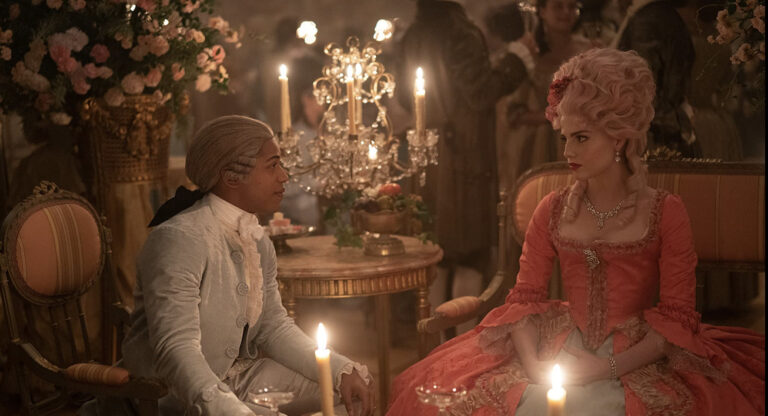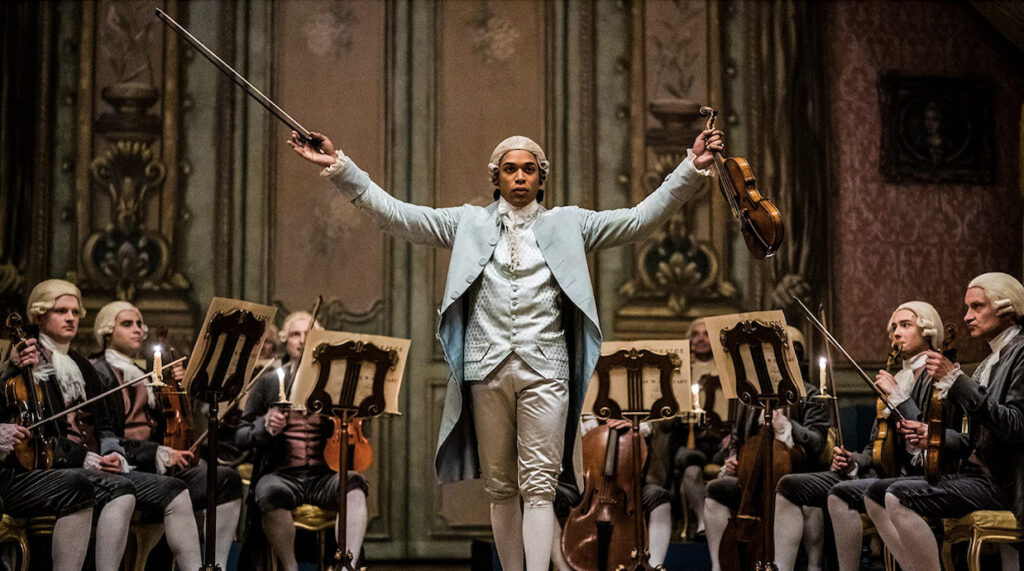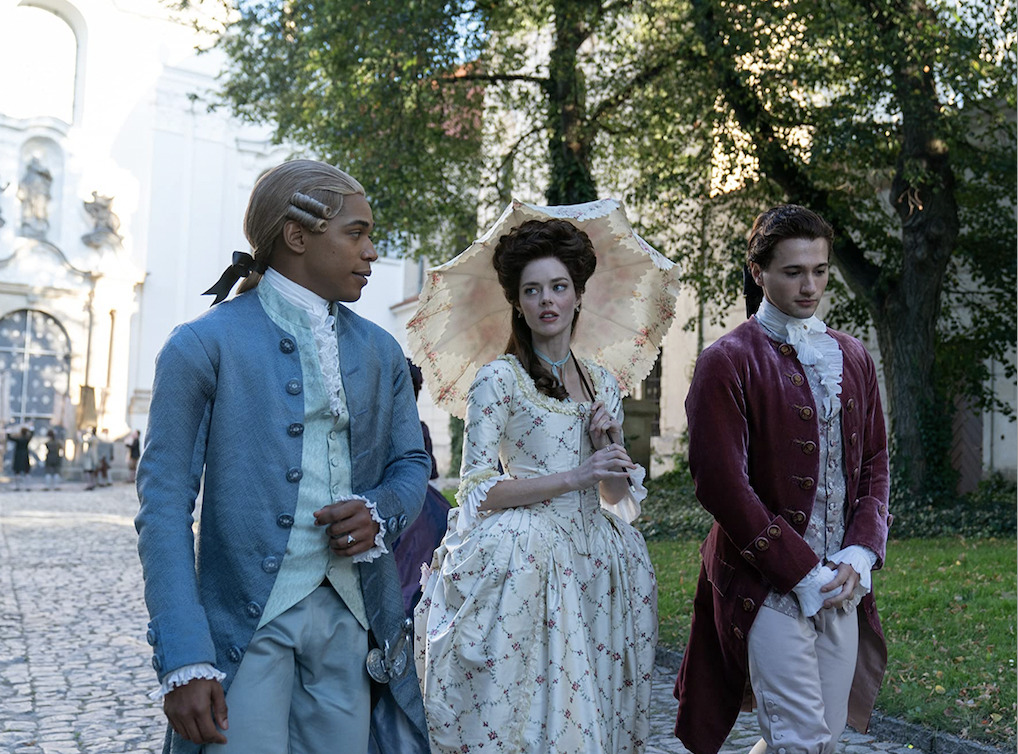
Inspired by the incredible true story of composer Joseph Bologne, Chevalier de Saint-Georges. The illegitimate son of an African slave and a French plantation owner, Bologne (Kelvin Harrison Jr. in a tour de force performance) rises to improbable heights in French society as a celebrated violinist-composer and fencer, complete with an ill-fated love affair and a falling out with Marie Antoinette (Lucy Boynton) and her court.
Rating: PG-13 (Thematic Content|Suggestive Material|Some Strong Language|Violence)
Genre: Biography, History, Drama, Music
Original Language: English
Director: Stephen Williams
Producer: Ed Guiney, Andrew Lowe, Dianne McGuigle, Stephani Robinson
Writer: Stephani Robinson
Release Date (Theaters): Wide
Runtime:
Distributor: Searchlight Pictures
Production Co: Stillking Films, Searchlight Pictures, Element Pictures

Exclusive Interview with Actress Lucy Boynton
Q: What was your first impression of the script that made you decide to tackle this project?
L.B: I think it was a combination of not being familiar with Joseph’s story, and so that whole research process being a real education and realizing that you could be a part of bringing that to broader audiences was really exciting. And then also the way that they were going about it. The way that they were delivering this impactful story in such a theatrical, dynamic film. It feels really electric and accessible for a contemporary audience, while delivering a really important message for a contemporary audience. And I think Searchlight makes such beautiful and artistic films as well. So, kind of every element was such a draw.
Q: Since you didn’t initially know much about Joseph Bologne, what did you find fascinating about his character and his presence?
L.B: I mean, I think the fact that he was obviously such a prolific person of such great skill, talent, diligence and success, and yet he’s not a household name – and that’s pointedly so and strategically so, he’s been strategically erased or left out of the history books. I think it’s important to remember that history books have had a very specific author, and to read outside of the curriculum and start challenging this perception of our history and our society as it’s been presented to us, because it’s not the full picture.
Q: You play the character Marie Antoinette, who has vast knowledge out there in the world that you can study, at the library or you can watch documentaries about her. So how do you narrow it down, what did you focus on in the research you did for playing this character?
L.B: I think it was kind of knowing that we’ve seen so many different iterations of her and knowing that I was free from having to do that, from having to convey every side of her, which I think is a responsibility or pressure you feel when you’re playing someone real, that you want to fully represent them. And the tone of the script was so specific and clear, and this character’s purpose in the film is very clear from an audience perspective or from an actor’s perspective, the vehicle that she is to drive this message.
So, it enabled me to be very specific with what I used. And I tried to read really broadly and read as much as I could about her and let that all filter in and let that inform my understanding of why she behaved the way that she did. But mostly it was being directed by the tone of the script.

Q: Speaking of a script, Stefani Robinson really emulated the character of womanhood, and this is really captured throughout the film. What was fascinating about her for you in the script that sort of captured you in a way that probably most men wouldn’t see?
L.B: Such a good question. I think it’s exactly that. It’s that when I read it, it was written by someone who had such a full understanding of people’s actions coming from their entire history, born from their entire past and experience and body of experiences. And when a character is written that way, it’s a gift for an actor, because it means that when you fill in those gaps yourself and do all the research, there’s space to just play out the scene because the context is kind of provided for the audience or it’s suggested towards. So, every character, no matter how long they’re on screen for, feels like a three-dimensional real person, if that makes sense.
So, I think it was just acknowledging that it’s written in such a specific and insightful way that you get such a strong impression. Marie Antoinette is punctuated throughout this film, she kind of bookmarks moments in Joseph’s life, and every scene you were aware that you were just dropping back into her life and that so much had happened between the last time you see her on screen and this time. And I think that’s such a gift of a starting point as well for an actor.
Q: Obviously, your character, Marie Antoinette, is showing the relationship Bologne, and what was the surprising element about their relationship that fascinated you? And can you talk about working with Kelvin Harrison, your chemistry together, and what kind of preparation you guys did together prior to shooting the film?
L.B: I think that relationship in the film is so interesting to analyze because initially it does just seem so earnest in their kind of being drawn to each other. I think, as everyone is with someone of such extreme talent, she was really drawn to him and he was so skilled, so magnetic that she really wanted to be around him.
There’s then also the element that is more superficial and transactional, which is that she wanted to be seen with him and she wanted him to be seen in her circle because it served her.
So, I think it was interesting letting that inform the later scenes where it is this genuine respect for him and genuine appreciation of him, but when it begins in that kind of self-serving way, I think that does make sense of the rest of their relationship or explains why she’s able to be so cold with him later. To be honest, it was really easy to find those early scenes with Kelvin because he’s such a joy to work with.
He’s such an easy person to be around. He’s magnetic and just so talented and kind and easy is the word I keep going to because I felt so at ease being on set with him.
Then for those later scenes, it’s just a gift to work with an actor who’s that talented and powerful in their performance. I think it always makes you better and makes you raise your game, too.
Q: Director Stephen William is not only a director, but he has also produced a lot of films and became executive producer on a lot of projects. How does his vision, seeing the whole concept of the setting, help you actually navigate your performance? Because it does seem different from typical directors.
L.B: I think because he’s so clear in how he explains the tone and the purpose of this film, the purpose of why he’s making this film and the way he wants to deliver this message to an audience, it enables you to be on the same team as him and with the same vision. And it allows you as an actor to modify your performance.
If you know the tone of the film as a whole, you can then start to break down the purpose of each scene of yours, the tone of them, what is required of them, and the reason that they’re going to be edited into this moment. I really love that technical, analytical side of this job, and he really gives you every tool to be able to do that really efficiently. It’s also really collaborative and encouraging and empowering as a director.
Check out more of Nobuhiro’s articles.
Here’s the trailer of the film.

